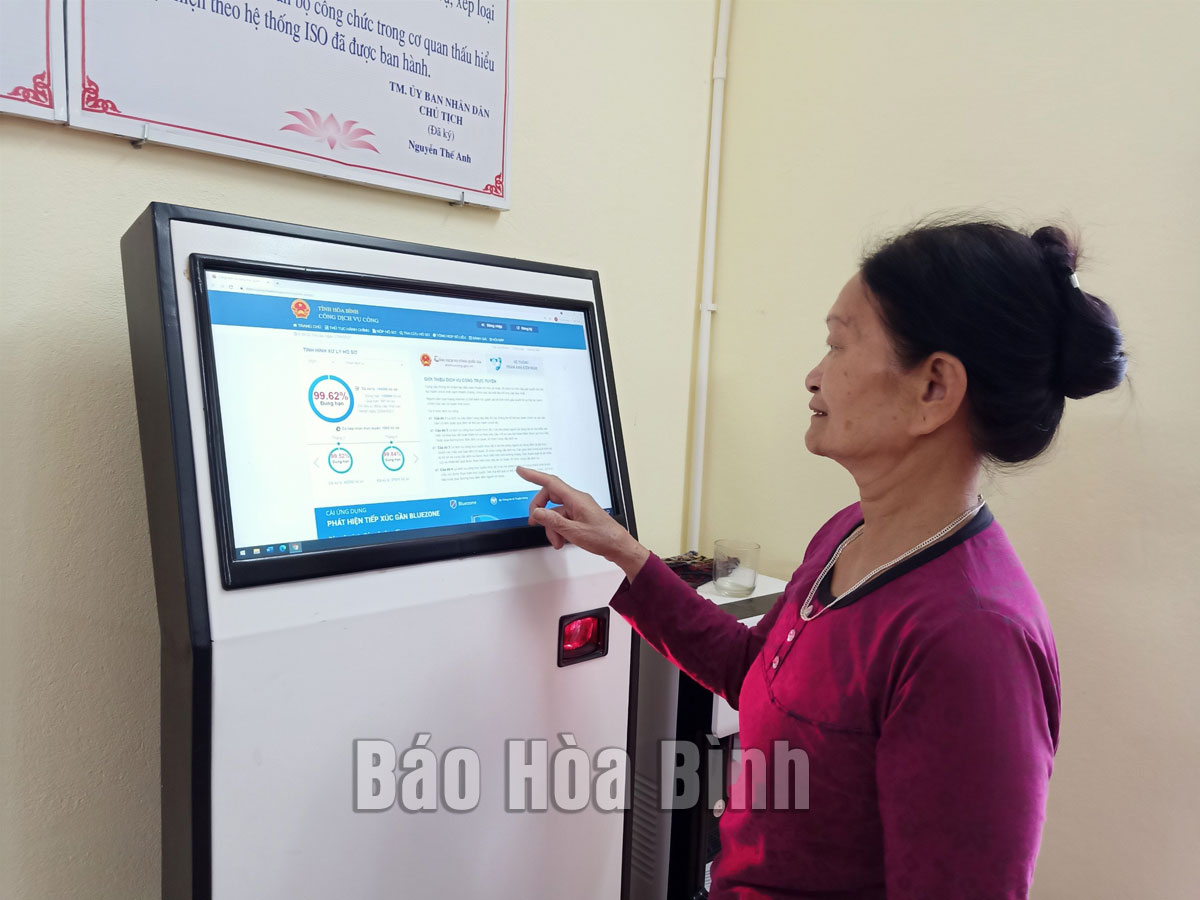
(HBO) – Identifying administration modernisation as the basis to build e-administration, Cao Phong district has invested resources in upgrading technical infrastructure and applying information technology to activities of administrative agencies, thereby improving productivity, reducing operational costs, saving time, and providing better public services to people and businesses.

A resident in Cao Phong
township of Cao Phong district looks for information at the single-window
division of the township People’s Committee.
Notably, Cao Phong district has paid attention
to applying IT to activities of agencies and units under its People’s
Committee, as well as those in its localities.
All cadres and civil servants from the district
to grassroots levels are now skilled at using computer while the use of
e-documents has been promoted at State agencies. At present, all the 10 communal-level
localities in the district have carried out the single-window mechanism, which
has proved effective.
Recently, Cao Phong has worked on institutional
reform and streamlined administrative procedures, obtaining initial encouraging
outcomes. It has also boosted communications to encourage people and businesses
to use online public services to settle administrative procedures.
So far, the Hoa Binh provincial Department of
Information and Communications has granted 295 work email addresses for cadres,
civil servants, and public employees of specialised agencies and non-business
units of the People’s Committees of Cao Phong districts and its localities.
More than 100 digital signatures have been applied in the district, enabling
100 percent of agencies and units to use digital signatures when issuing
documents.
Nguyen The Tung, deputy head of the district’s
office for home affairs, said localities in Cao Phong district have made
improvements to the settlement of administrative procedures under the single-window
mechanism. Machines have also been installed at their single-window divisions
to help people look up information.
These moves have helped improve State agencies’
performance and win over people and businesses’ satisfaction and trust, he
noted.
In the time ahead, local authorities will
continue ordering agencies to effectively apply IT to their activities,
capitalise on the online information network linking the district People’s
Committee with the provincial administration, step up administration
modernisation, and apply the ISO 9001:2000 quality management system to
administrative bodies.
In the spirit of "Party members go first, the people follow”, all households of Party members in the Doan Ket sub-region in Da Bac town, Da Bac district, voluntarily removed gates and fences, and donated land when the road expansion project passed through their properties. Inspired by their example, 68 households in the sub-region quickly followed suit, contributing over 1,400 sq.m of residential and perennial cropland to widen the main road through the residential area. The exemplary role of Party members in Doan Ket stands as a shining example of studying and following President Ho Chi Minh’s thought, morality, and lifestyle.
The Hoa Binh provincial People's Committee held a monthly meeting on May 29 to assess the implementation of socio-economic development tasks in the first six months of 2025, the progress of key projects, and some other important issues.
During his lifetime, President Ho Chi Minh always expressed his deep affection and special concern for children and youth. He once emphasized: "Caring for and educating children well is the responsibility of the entire Party and the entire people”; "First of all, the family (i.e. grandparents, parents, siblings) must do this job well”. "the Party Committees…, the Children’s Committee, the Youth Union, the education sector, and all related organizations must have specific plans to ensure children grow healthier and more progressive”. His teachings has been remaining valuable and serving as the guiding principles in the work of protecting, caring for, and educating children. In line with this ideology, Hoa Binh Province has continuously been prioritizing and investing resources in the well-being of children in recent years.
Mr. Nguyen Phi Long, the alternate Member of the Party Central Committee and Secretary of the Provincial Party Committee chaired the meeting of the Standing Committee of the Provincial Party Committee to provide opinions on several investment projects within the province. There was the attendance of Ms. Bui Thi Minh, the Permanent Deputy Secretary of the Provincial Party Committee and Chairwoman of the Provincial People’s Council; Mr. Bui Đuc Hinh, the Deputy Secretary of the Provincial Party Committee and Chairman of the Provincial People’s Committee and other members of the Standing Committee; the leaders from other departments, agencies, and some localities.
The Standing Board of the Vietnam Fatherland Front (VFF) Committee of Hoa Binh province held a meeting on May 28 to honour outstanding village elders, village heads, and reputable individuals from local ethnic minority and religious communities.
In mid-May, the provincial Museum organised an exhibition named "Duoi la co Dang Cong san Viet Nam quang vinh” (Under the flag of the glorious Communist Party of Vietnam). This meaningful activity took place in the joyful atmosphere to celebrate the country's major holidays and the Party congresses at all levels for the 2025-2030 term, towards the 14th National Party Congress.



